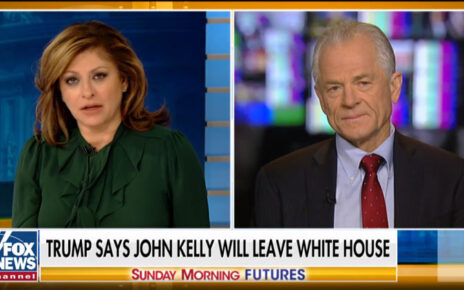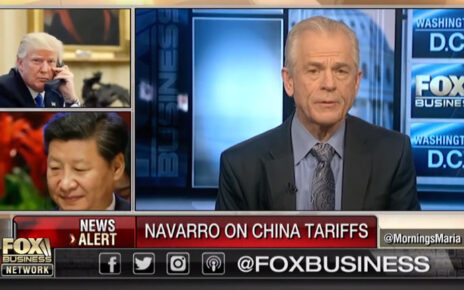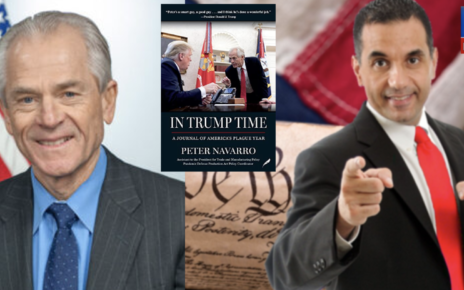Transcript: Peter Navarro on “Face the Nation,” August 18, 2019
The following is a transcript of the interview with Peter Navarro, the director of the White House Office of Trade and Manufacturing Policy, that aired Sunday, August 18, 2019, on “Face the Nation”
August 18, 2019 – Face the Nation
The following is a transcript of the interview with White House trade adviser Peter Navarro that aired Sunday, August 18, 2019, on “Face the Nation.”
TRANSCRIPT:
MARGARET BRENNAN: We now turn to one of the president’s key advisors on China, White House director of the Office of Trade and Manufacturing Policy Peter Navarro. Thank you for being here.
PETER NAVARRO: Good to be with you this morning Margaret.
MARGARET BRENNAN: Does the U.S. stand with these pro-democracy demonstrators?
NAVARRO: President has been quite clear that he hopes for a peaceful outcome. He’s urged people to remain calm. It’s gratifying today that the protests are peaceful. The issue here, as your viewers well know, is that China promised in a treaty with Great Britain that the people of Hong Kong would be able to determine their own future until 2047 and that’s an important commitment we hope they’ll make. That’s- that’s all I can tell you about that.
MARGARET BRENNAN: There is this perception though that the White House is pulling punches on human rights issues because it wants this trade deal that you are working on finalized. Will Beijing face consequences if there is any kind of crackdown?
NAVARRO: I can tell you that the issue of Hong Kong has never been part of the trade negotiations. I won’t speculate about what may or may not happen. I think we just need to remain calm, encourage the Chinese to fulfill their commitments and what I worry about when I go to work every day is creating manufacturing jobs for men and women of America. So I think about littoral combat ships being made in Marinette, Wisconsin or combat vehicles in Lima, Ohio or getting a new production line in Greenville, South Carolina for the F-16. So that’s my mission at the White House and that’s my lane.
MARGARET BRENNAN: So in that vein, we’ve had a strong economy–
NAVARRO: We have a strong economy.
MARGARET BRENNAN: –low employment, unemployment–
NAVARRO: Historically low–
MARGARET BRENNAN: Historically low–
NAVARRO: –for blacks, women, Hispanics.
MARGARET BRENNAN: –S&P 500 up something like 15 percent on the year–
NAVARRO: It’s a beautiful thing–
MARGARET BRENNAN: Rocky week though.
NAVARRO: Beautiful thing.
MARGARET BRENNAN: And there are now some signs emerging that perhaps there is a slowdown coming. What are the odds that you see of a recession?
NAVARRO: So- before I came to the White House, I spent the better part of 20 years forecasting the business cycle and related stock market trends. What I’m seeing looking at all the macro tea leaves is a very strong Trump economy and bullish stock markets through 2020 and beyond. And the- the things I’m seeing now in the short run that your viewers can- can watch to see if they come to fruition would be, for example, the Federal Reserve aggressively lowering rates through the end of the year. The Fed raised rates too far too fast. They’ve cost us a full point of GDP growth–
MARGARET BRENNAN: They are expected to lower them.
NAVARRO: They are expected to. Second thing, the European Central Bank has announced a very aggressive stimulus package cutting rates and quantitative easing. Why does that matter for us?–
MARGARET BRENNAN: Central bank buying securities.
NAVARRO: Correct. And the- that will lift the European economy and what that matters for us is they’ll buy more of our exports. There’s a- a likelihood that China will engage in a second round of fiscal stimulus, which will help the emerging markets which deliver the commodities to the Chinese manufacturing machine. And- and most important in the short run for America here is by early October we hope that Congress rises above partisan politics and passes the US-Mexico-Canada Agreement. That will add several hundred thousand jobs to our economy.
MARGARET BRENNAN: Has Speaker Pelosi agreed to do that?
NAVARRO: Speaker Pelosi is working closely with Ambassador Robert Lighthizer. And we are trying to work with the Democratic side to basically address all our concerns about enforcement and other things. This is—no hyperbole here—the biggest deal in world history, but it is also in my judgment one of the smartest and best deals. And what it does, the central premise of the deal, is to bring our manufacturing jobs back here to US soil from the giant sucking sound that was NAFTA.
MARGARET BRENNAN: That would be helping to settle the trade dispute with Canada and Mexico. On the issue of China though, President Trump, here he is earlier this week explaining why he pulled back on a pledge to roll out some tariffs related to consumer products.
PRESIDENT TRUMP SOT: We’re doing this for Christmas season just in case some of the tariffs would have an impact on US customers, which so far they’ve had virtually none.
MARGARET BRENNAN: So have U.S. retailers convinced the president that it is American importers and consumers who will pay the price for these tariffs.
NAVARRO: So- so let’s be clear. We’ve had tariffs on for over a year. The Chinese have borne the entire burden of that by slashing their prices and reducing the value of their currency by 12 percent.
MARGARET BRENNAN: The president just said there though–
NAVARRO: Correct–
MARGARET BRENNAN: That he’s doing this out–
NAVARRO: –now, well, let’s look–
MARGARET BRENNAN: of concern it could hurt consumers.
NAVARRO: Let’s look at why the president delayed half of the tariffs until December 15th. I was there in the Oval Office when a group of business people came in and made the following very persuasive argument. They had already bought everything that was going to be on our shelves, but they’d done it in dollar contracts which means they weren’t able to shift the burden back to the Chinese, but they also told the president quite clearly that they were also moving their production sourcing and supply chain out of China as fast as possible and so beyond December 15th there will be no impacts on consumers because of all of that. So it was a goodwill gesture that the president made to the Chinese. It was a wise decision to delay the tariffs to December 15th and in the meantime half of those tariffs are actually going on September 1st. The tariffs are working. They’re important part of the strategy to bring the Chinese to the negotiating table. And I think, Margaret, it’s important whenever we talk about the tariffs we talk about what we’re fighting for.
MARGARET BRENNAN: But they haven’t made any concessions just yet, the Chinese and in fact–
NAVARRO: So–
MARGARET BRENNAN: –they’ve pulled back on some promises.
NAVARRO: Yes, but- but like- as I say it’s important for your viewers to understand what we’re fighting for and it’s the hacking of our computers to see our trade secrets, forced technology transfer as a condition of market access. It’s the intellectual property theft, the dumping, the state owned enterprises, the currency manipulations–
MARGARET BRENNAN: And that is why so many people on Wall Street cheer this hard line and–
NAVARRO: –and they- they- do–
MARGARET BRENNAN: –so many people in Middle America do too but-
NAVARRO: –but let me give you the–
MARGARET BRENNAN: –then you have farmers coming out and warning that they are losing markets that they are getting hurt–
NAVARRO: –but–
MARGARET BRENNAN: –which is why the taxpayers are bailing them out. And you have concerns from Wall Street–
NAVARRO: Understood.
MARGARET BRENNAN: –being indicated here with pullbacks in future purchases of things like tractors.
NAVARRO: So let- let me say two things. One is the seventh act of aggression which I want to mention is the killing of Americans with ‘Made in China’ fentanyl and opioids. By the end of the day it’ll be over 100. By the end of the week it’ll be over a thousand and China- ‘Made in China’ opioids are killing over fifty thousand Americans a year. That in and of itself is grounds for- for a very tough stand against China. With respect to the farmers, President Trump has the backs of farmers. He’s demonstrated that with Sonny Perdue, the Department of Agriculture secretary, by setting up a program where we use whatever revenues we collect from the- the tariffs and whatever else we need to make sure the farmers are whole in America. The farmers have their back. The farmers know that they’re- they’re in the target of the bully, China, but we’re not going to let that buckle the president’s knees. He is committed to this fight. He has the backing of the public–
MARGARET BRENNAN: But you do not–
NARAVVO: –he has the backing–
MARGARET BRENNAN: –but you do accept–
NAVARRO: –of people like Joe Manchin and- other Democrats on Capitol Hill–
MARGARET BRENNAN: A lot of people like this–
NAVARRO: –we are aligned–
MARGARET BRENNAN: –but they don’t like the tools–
NAVARRO: Yea.
MARGARET BRENNAN: –like tariffs and so–
NAVARRO: Well–
MARGARET BRENNAN: –how can you–
NAVARRO: I understand–
MARGARET BRENNAN: –promise the American public that they will not feel the impact of these tariffs backfire to them if the people who sell them goods, like retailers, convinced the president that they would?
NAVARRO: So let me say two things. We’ve had tariffs on for over a year, 250 billion dollars worth, and we haven’t seen a thing in terms of inflation. We’ve seen the- the Chinese–
MARGARET BRENNAN: Economic indicators–
NAVARRO: –devalue–
MARGARET BRENNAN: –are backward looking–
NAVARRO: –devalue–
MARGARET BRENNAN: –versus the market which is forward looking–
NAVARRO: Devalue their currency and- and slash their prices. Going forward, what we’re seeing is the fleeing of the supply chain. What’s happening is retailers are finding other sources of supply and we’re getting investment back here in America- and by the way, consumers spend 14 trillion dollars a year. If we have 10 percent tariffs on 300 billion dollars worth of goods–
MARGARET BRENNAN: Yea.
NAVARRO: –that’s 30 billion dollars. Even if all of that were passed on to consumers, you know what that would be? That would be one fifth of one percent on the consumer price index–
MARGARET BRENNAN: Alright.
NAVARRO: It’s nothing.
MARGARET BRENNAN: We have to leave it there.
NAVARRO: Thank you.
MARGARET BRENNAN: Peter Navarro, thank you for joining us–
NAVARRO: Nice- nice to be with you on FACE THE NATION.



